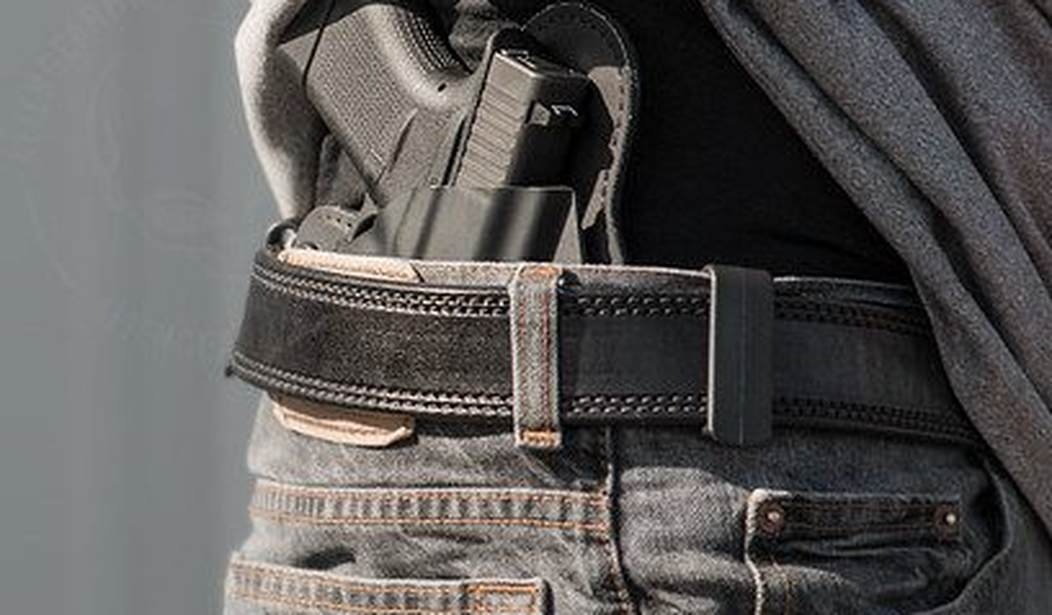When Democrats managed to take control of Michigan's legislature in 2022, gun control was one of the top priorities for the slim majorities in the House and Senate. Gov. Gretchen Whitmer soon signed several gun control measures into law, including a "red flag" statute and a gun storage mandate, but anti-gun activists continue to push for even more extreme restrictions, including a ban on so-called assault weapons and prohibiting the sale and possession of "large capacity" magazines.
Given their complete control of the statehouse and the governor's office, why haven't Democrats in Michigan gone even further than the gun control bills that have been enshrined into law? Despite assurances from the gun control lobby that wide swathes of voters approve their "common sense" infringements, Democratic lawmakers may be reluctant to go too far, too fast thanks to the growing number of Democrat voters who are embracing their Second Amendment rights.
As the Lansing State Journal recently reported, concealed carry permits have soared across the state in recent years, with about 11% of the adult population in Michigan now possessing an active concealed carry license. The paper claims that concealed carry holders are "more likely than ever before to be liberal-leaning residents in urban areas", which makes gun control a riskier proposition for Michigan Democrats than their counterparts in, say, California.
The data confirms long-held assumptions and trends about firearm ownership being more common among white people who live in rural, politically conservative areas. But early in the pandemic, during one of two application spikes in the past decade, that started to change.
And LaMaris Rodgers could see it early on.
Rodgers, 36, is a Waverly High School graduate and a firearm trainer. He said he could see the interest in firearms and CPLs skyrocketing during the pandemic's first year, including a large increase in Black gunowners and those who lived in cities. Shutdowns had people panicked and, he said, clients told him they'd called police and had no one respond.
"People wanted to learn to be their own first responder," he said.
In 2021, the tally of granted concealed pistol licenses, which allow their holders to carry a concealed handgun in Michigan, had reached a new high. The previous record for CPLs issued in a single year was 170,961 in 2017, the first data released after Donald Trump was elected president.
Rates dropped the next year, staying under 140,000 issued CPLs for the next three years before starting another upward climb in 2020, according to a State Journal analysis.
In 2021, Michigan issued more than 232,000 carry licenses — a 36% increase over the previous record set just five years earlier.
By 2023 the number of new applicants had declined to 161,065, but that's still far higher than the number of applicants the state saw between 2017 and 2020, when the COVID pandemic and civil unrest prompted many Americans to take a second look at their Second Amendment rights.
Rogers says many of the students in his classes don't fit the traditional stereotype of gun owners. In fact, it's not uncommon for his clients to have little firsthand experience with firearms at all.
Among the takeaways from the surge in firearm ownership that started early in the pandemic was that a major driver of purchases were Black, liberal-leaning, first-time gun owners from urban areas, researchers found.
Rodgers, who teaches firearm training classes in Lansing, said the number of Black women who have a handgun gun and CPL might surprise people. He and a business partner have held firearm training classes specifically for domestic violence victims. The state requires CPL applicants to take a handgun training class.
"We have people who have trauma, who have dealt with trauma," Rodgers said. "There's that terrifying fear (of the gun) at first."
Rogers helps to replace that fear with the confidence that comes from education and training, and he says that if more people had access to classes, it would do wonders to help bring down the crime rate, even among juveniles.
He also sees one possible path to addressing gun violence in Lansing and elsewhere: gun education for young people.
"It's very simple," he said. "I don't oversimplify it because that takes away from those who have lost people or are victims."
The prevalence of firearms in TV, movies and popular culture gives them an allure and a sense of being forbidden, he said, that naturally creates a sense of curiosity for some.
If, at that point, firearm education and training — with a focus on the dangers and proper handling — are introduced, then Rodgers said he believes young people will quickly see that picking up a gun to settle an argument isn't their only option.
Unfortunately, the overwhelming mindset among both Democratic officials and Democratic voters is that an abstinence-based approach to guns is the only solution. They don't want to educate adolescents about how to be safe and responsible with a firearm, because they believe that might encourage them to pick up a gun. Meanwhile, kids are seeing their peers illegally access and misuse firearms on social media on a daily basis. Like it or not, they are getting an education on guns. The question is who do we want teaching them?
The influx of concealed carry holders hasn't made Michigan a more dangerous place. In fact, last year Detroit had the fewest number of homicides in 57 years. Responsible gun owners aren't the problem, but they do represent a growing share of the vote in the state. If Democrats keep painting lawful gun owners as an issue that needs to be addressed, they could very well see their slender majorities vanish in November, which might be why we're not hearing much talk from Whitmer and her legislative allies about big-ticket gun control measures like gun and magazine bans.








